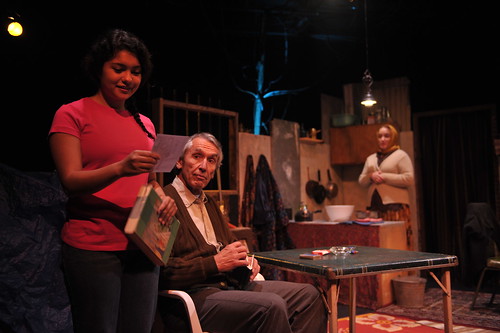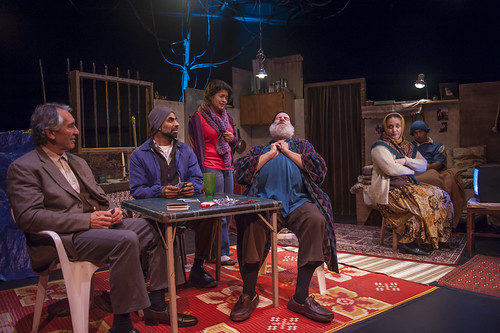Family, politics, history tangle in Golden Thread's Urge
 Camila Betancourt Ascencio (left) is Jamila, an ambitious Palestinian girl living in Lebanon in a refugee camp with her father, Adham (Terry Lamb, center), mother, Abir (Tara Blau) and other family members in Golden Thread's production of Urge for Going by Mona Mansour. BELOW: The cast of Urge for Going includes, from left, Lamb, Munaf Alsafi, Ascencio, Julian Lopez-Morillas, Blau and Wiley Naman Strasser. Photos by David Allen
Camila Betancourt Ascencio (left) is Jamila, an ambitious Palestinian girl living in Lebanon in a refugee camp with her father, Adham (Terry Lamb, center), mother, Abir (Tara Blau) and other family members in Golden Thread's production of Urge for Going by Mona Mansour. BELOW: The cast of Urge for Going includes, from left, Lamb, Munaf Alsafi, Ascencio, Julian Lopez-Morillas, Blau and Wiley Naman Strasser. Photos by David Allen
The remarkable thing about Mona Mansour's Urge for Going and the work of Golden Thread Productions is how effectively the complex world of the Middle East comes through in a moving family drama. A very personal story set against a sprawling backdrop of history, politics and geography forges a strong emotional connection and brings a distinct perspective to a part of the world that can feel overwhelming if, like me, you know precious little about real-life experiences there.
Certainly drama benefits from conflict and tension, and that's where Mansour's story, set in Palestinian refugee camp in Lebanon, begins. In an introduction called "The Noise," members of a family attempt to explain the history of the refugee camp and how in 1948, with the formation of the State of Israel, hundreds of thousands of Palestinians were displaced and sought refuge in Lebanon, Jordan and Syria. The "temporary" camps received another infusion of refugees in 1967 with the occupation of the West Bank and Gaza, so nearly 60 years later (the play is set in 2003) the camp is, as Mansour puts it, "permanently impermanent." But the thing about "The Noise" is that no one can seem to agree on the historical details. Some even take issue with one another's tone of voice when discussing the topic.
The thought of living in a refugee camp like that, cobbling together a home and an existence for you and your family is hard enough. But to think you're living that way with the promise of returning to your homeland always hovering vaguely in the distance – it just seems impossible.
And yet that is how this family, like so many others, is living. Some family members have been there since 1948. Others arrived in 1967, and somehow they make it work.
While the older generation holds out some hope that promises will be kept and the refugees will go home, the younger generation, represented here by high-schooler Jamila (Camila Betancourt Ascencio), sees the return as a pipe dream. Jamila knows her future options are limited, so she's seizing on the one within her reach: taking the baccalaureate exam and going to college. Being the daughter of a scholar (Terry Lamb as Adham), Jamila is inspired to follow in her father's footsteps.
What's interesting here is the complicated relationship between father and daughter. Adham and his wife, Abir (Tara Blau) had the opportunity to stay and work at a school in London many years ago, but returned home only to end up in the refugee camp and a life of subsistence. Now Adham is ambivalent about his daughter's attempts to study for her exam and finagle the necessary paperwork and photo IDs to secure an exam appointment.
Jamila and her older brother, Jul (Wiley Naman Strasser) play a fascinating game together, a sort of fantasy talk show in which she imagines herself with multiple PhDs, traveling the world and changing it. The fact that her brother is brain damaged – we're told he went out of the house one way and came back another – only underscores the poignancy of the game. Jamila has a chance, albeit a small one, to escape her family's dire circumstances, while Jul does not. His primary pleasure in life is watching "Baywatch" reruns on a tiny television.
Emotions run high and strong in director Evren Odcikin excellent production. His cast, which also includes the extraordinary Julian Lopez-Morillas and Munaf Alsafi as uncles sharing Jamila's home, cuts right to the emotional heart of Mansour's powerful story. The details here are important – setting historical context, all of that – but at a certain point, we're not just learning about life in the Middle East. We're connecting with a family in the way that good drama finds those universal family heartbeats. On some level it could be O'Neill or Miller or Williams. The circumstances are unique, but a family's love and loyalty, complicated by loss, strife and politics that affect your daily life, are part of a universal story and one we need to hear over and over again and connect with over and over again.
Set and lighting designer Kate Boyd depicts a ramshackle collage of a shelter – some cinderblock, some plywood, some plastic tarp – with a loosely wired electrical system providing a tentative current. But watching the family prepare a meal or reconfigure the sparse furniture for the sleeping of five people in a tiny space serves as a reminder: a home is a home is a home.
Ascencio as Jamila bears much of the story's weight, and she's marvelous, as is Strasser as Jul. There's humor and depth and passion in all the performances, making Mansour's intimate family drama all the more personal, all the more powerful.
FOR MORE INFORMATIONGolden Thread Production's Urge for Going by Mona Mansour continues through Dec. 8 at Z Below, 470 Florida St., San Francisco. Tickets are $10-$35. Visit www.goldenthread.org.
